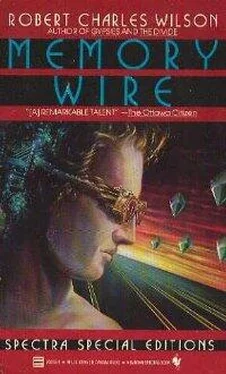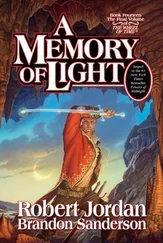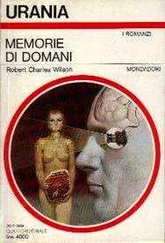Robert Wilson - Memory Wire
Здесь есть возможность читать онлайн «Robert Wilson - Memory Wire» весь текст электронной книги совершенно бесплатно (целиком полную версию без сокращений). В некоторых случаях можно слушать аудио, скачать через торрент в формате fb2 и присутствует краткое содержание. Год выпуска: 1987, ISBN: 1987, Издательство: Bantam Spectra, Жанр: Фантастика и фэнтези, на английском языке. Описание произведения, (предисловие) а так же отзывы посетителей доступны на портале библиотеки ЛибКат.
- Название:Memory Wire
- Автор:
- Издательство:Bantam Spectra
- Жанр:
- Год:1987
- ISBN:978-0-553-26853-9
- Рейтинг книги:4 / 5. Голосов: 1
-
Избранное:Добавить в избранное
- Отзывы:
-
Ваша оценка:
- 80
- 1
- 2
- 3
- 4
- 5
Memory Wire: краткое содержание, описание и аннотация
Предлагаем к чтению аннотацию, описание, краткое содержание или предисловие (зависит от того, что написал сам автор книги «Memory Wire»). Если вы не нашли необходимую информацию о книге — напишите в комментариях, мы постараемся отыскать её.
Memory Wire — читать онлайн бесплатно полную книгу (весь текст) целиком
Ниже представлен текст книги, разбитый по страницам. Система сохранения места последней прочитанной страницы, позволяет с удобством читать онлайн бесплатно книгу «Memory Wire», без необходимости каждый раз заново искать на чём Вы остановились. Поставьте закладку, и сможете в любой момент перейти на страницу, на которой закончили чтение.
Интервал:
Закладка:
“What is it like?”
“You care?”
She shrugged.
He said, “It’s like walking in a cloud. You’re above everything. Above fear, above your body. Your body’s a machine, you move it along, take it where it’s supposed to go. Everything is very clear, very lucid, because there’s no good or evil, no better or worse. You just look. Everything is what it is. No more, no less.”
It stirred a memory in her. “I can see how that might be attractive.”
“It is. But it wears you out. It’s cold. It’s like standing out on some mountain. You get scared to be so far above it all, scared you’ll never get down again. And some don’t.”
“Like Ray?”
“Maybe like Ray.”
“But you said you trusted him.”
He shrugged. “I think it’s always been a hard choice for him. He has some bad memories out of the war, so there’s this incentive … the need to stay above it. But I think the truth is that he’s not comfortable there. Some part of him wants to climb back down. Even after all this time.” He looked at her. “This matters to you?”
“I was curious.”
They turned back toward the hotel. “It would not be a good idea,” Byron said, “to care too much about Ray Keller.”
Teresa shrugged.
That night she dreamed again of the nameless girl in rags and twine shoes.
The girl looked at her from the depths of her huge brown eyes. As ever, Teresa was caught up in the urgency of that gaze. Darkness like smoke swirled around her; anxiety filled the turbulent air.
“Almost home now,” the girl said faintly. “Almost home.”
CHAPTER 6
1. Keller was ten years old when the discovery of the oneiroliths in the Amazon Basin made international headlines. He remembered leaning out the window of the single-bedroom apartment above his father’s garage, aiming a polystyrene thread-rifle at a line of dung-brown hills while the TV droned on about “artifacts of extraterrestrial origin.” It was a Sunday afternoon and the Public Works had turned on the water supply; his father was down on the tarmac soaping fiberglass car bodies. Keller paid only intermittent attention to the video screen because he knew the whole thing was a lie.
His father had told him so last night. His father sat in the big easy chair which dominated the shabby room and said, “It’s bullshit, Ray. Mark my words.” Keller thought his father looked disturbingly small in this oversized chair: it emphasized his leanness, the arthritic bulge of his finger joints and elbows, the sparseness of his hair. “Stones from outer space.” His adult voice was rich with scorn and authority. He had migrated here from Colorado before Keller was born, had achieved what Keller understood, even then, was an unhappy and marginal life. “Christ almighty, what a crock.” Who could doubt it?
His skepticism was short-lived. It was replaced very soon by boredom, and that was pretty much the reaction of the entire country. Interesting things came out of the oneiroliths over the next few years but they were all more or less abstruse: new mathematics, a subtler cosmology. Important but, in the raw, unspectacular. The profounder questions—where had the stones come from, who had left them, why?-—went unanswered. In time, no one asked. Speculation was abandoned to cultists, science-fiction writers, and the tabloid newspapers. Out in the real world there were more important things to worry about. The Russians, for instance, smuggling wire missiles and military software to disenfranchised posseiros down in the Basin: where might all that lead?
“Grade-A bullshit,” Keller’s father had ruminated from the depths of his chair. Keller nodded to himself and fired “his toy rifle thoughtfully at the bole of a palmetto. Zing, the rifle said.
Ten years later he had learned to fire a real rifle in a real jungle. Crudely grown crystal ’liths circulated freely among the combat troops in the Basin, and Keller was impressed the first time he saw one: a device, he thought, a kind of machine from another world. But when he held it in his hand, he was suddenly back in that dusty apartment with the smell of gasoline and ancient auto upholstery rivering through the window and the grating echo of his father’s voice: mark my words. Except that Keller’s father was three years in his grave now, a cancer statistic, and the memory was scaldingly vivid—a kind of resurrection. He dropped the stone as if it had moved in his hand, and backed away, gasping.
It had surprised him, that a memory could be so frightening.
The road to Cuiaba was littered with relics of the war. Teresa saw the broken shapes of war machines in the green valleys beside the road, and felt some echo of the violence that must have raged through here.
It was a relatively new road, Keller told her, only a little older than the war. The road was a ribbon of macadam that cut like a geographer’s line through the province of Goias, swept on a spidery suspension bridge across the boiling water of the Araguaia and then into the deep Mato Grosso.
The world beyond the bus window startled and impressed her. Strange, she thought, to have come so far so quickly. The horizon was endlessly green as far as she could see, which, when the road wound up a hillside, was very far indeed. A wilderness, she thought. The idea had become stunningly real to her. A wilderness, a place where no cities were, an anarchy of nature. The landscape was as profoundly alien as anything she had seen in a stone trance. The few visible traces of human work—a blackened Army troop carrier showing its chitin through the riotous green, tanagers roosting on its gutted turrets—only reinforced the feeling.
Somewhere out here was the place where Keller had met Byron. Buried history. Somewhere out here, too, was the oneirolith mine. Cruz Wexler’s gnosis, the alien, the Other (she had told Keller). And something more personal.
They traveled into the sunset and beyond it. The sky darkened; reading lamps blinked on overhead. Byron pulled his wool cap down over his eyes and slept. Keller was lost in a magazine he had brought from Brasilia. The bus was mostly empty; the other passengers were unhappy businessmen in wrinkled suits, a few Koreans with drugged expressions, snoring posseiros in the cheap rear seats. A few tourists… like us, she thought, and then, but we’re not. She considered sleep but guessed it was impractical; she felt the pressure of the wilderness too acutely.
A little before midnight Keller reclined his seat and dozed off. Smiling faintly, she found herself watching him: watching the way his face relaxed into sleep. He looked different, she thought, with all the daylight tension drained out of him.
She thought, He’s an Angel.
Odd, how easy it was to forget that. Talk to him, she thought, and you could be talking to a million people. Everything he saw was spooling down into his mechanical memory, buried somewhere inside him: Remembering for the masses.
She wondered if he could turn it off… whether he would if he could.
She slept in spite of herself. When she woke in the heat of the morning, the wilderness was gone; the bus moved through a steaming box barrio, tin shacks riding up dirty little hills—the outskirts of Cuiaba, Keller said. “It’s an ugly town. A meat town. The abattoir is the only real business.” He wrinkled his nose. “You can smell it already.”
“You were here before?”
“In the war,” he said wearily. “It was a staging base. From here we rode carriers out along BR-364. Lots of guerilla activity in the farm towns out that way.”
So it had been an Army town. That explained all the signs she had seen in English and in cursive Japanese: Bar Grill, Live Sex Acts, manga outlets. The bus station itself was a cavernous concrete structure crowded with humanity. Old diesel buses filled it with their stinking fumes, and the names written on cardboard signs over the ticket windows were all strange to her: Ouro Preto, one said; Ariquemes, another. She shouldered her bag and they left the terminal, Byron leading them to some hotel Wexler had told him about; a man would meet them there, Wexler had promised. She felt lost, walking among these ancient colonial buildings. It was a bad neighborhood, more bars, ragged men sleeping on the fractured sidewalks. Down one alley near the hotel she saw a sign that intrigued her: Church of the Vale do Amenhecar, it said, and in the dusty window beneath it there was the painted image of an upraised hand, a dreamstone radiating from the palm.
Читать дальшеИнтервал:
Закладка:
Похожие книги на «Memory Wire»
Представляем Вашему вниманию похожие книги на «Memory Wire» списком для выбора. Мы отобрали схожую по названию и смыслу литературу в надежде предоставить читателям больше вариантов отыскать новые, интересные, ещё непрочитанные произведения.
Обсуждение, отзывы о книге «Memory Wire» и просто собственные мнения читателей. Оставьте ваши комментарии, напишите, что Вы думаете о произведении, его смысле или главных героях. Укажите что конкретно понравилось, а что нет, и почему Вы так считаете.












